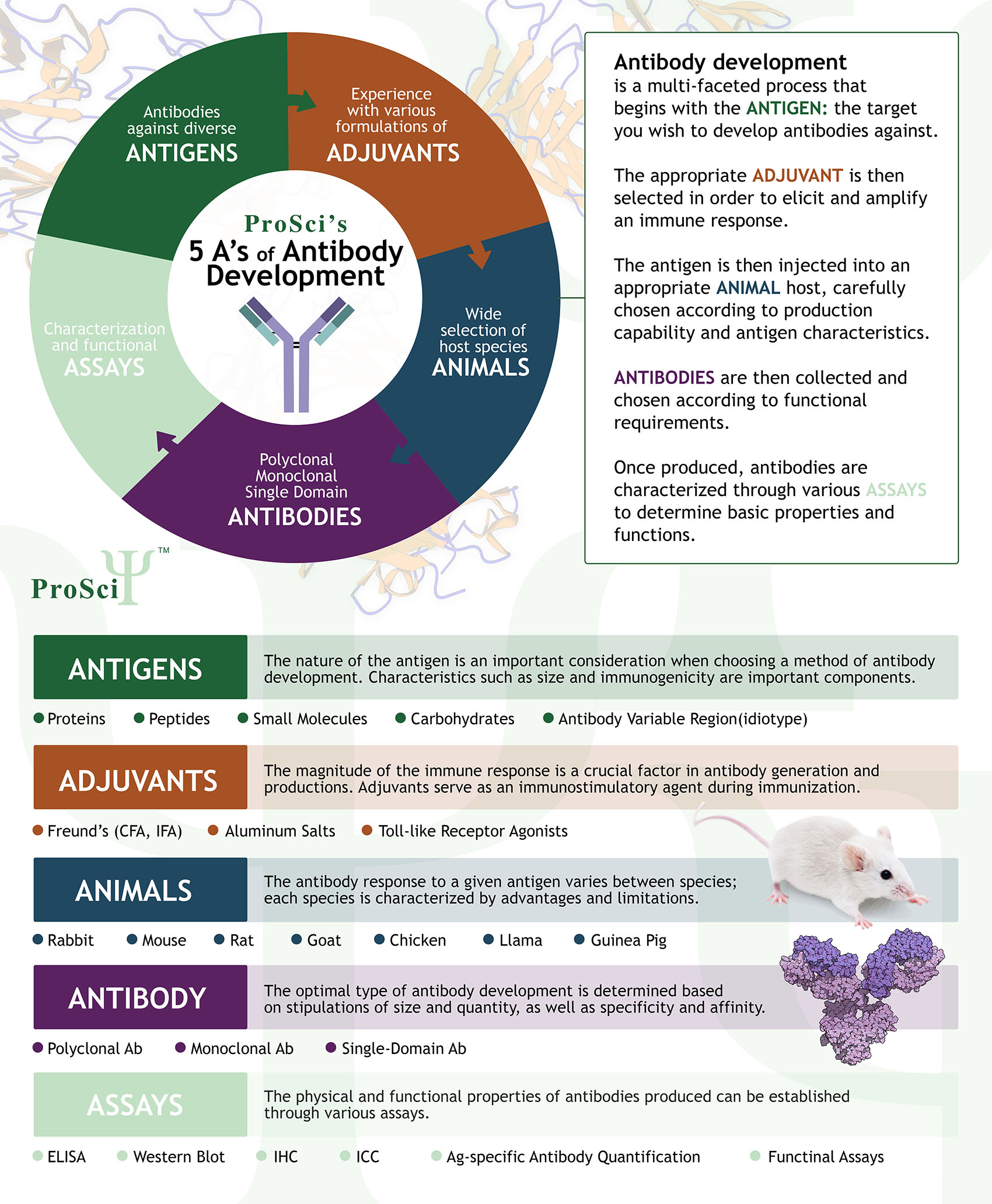Antibody development is multi-faceted process that begins with the target to which you wish to develop antibodies against: the antigen. To elicit an immune response we must select the appropriate adjuvant to be mixed with the antigen for immunization. Which animal to choose for antibody production may depend on the nature of your antigen and how much antibody you will need. The purpose and specific function required of your antibody will determine the type of antibody you choose. After your antibody has been produced, it can then be characterized to define its basic properties and functions through various assays.
Antigen
Antibody development revolves around understanding and targeting the correct antigens in ways that yield a desired response. There are several types of novel antigens, including proteins, custom peptides, small molecules, carbohydrates, and even antibody variable regions. With a just 1-2mg sample of an antigen, it is possible to create the necessary immune response for antibody development.
The nature of the antigen is an important one when choosing the antibody development path. An antigen’s immunogenicity and size are two factors to consider.
• Small Molecules • Proteins • Carbohydrates • Peptides • Antibody Variable Region (idiotype)
Adjuvant
An adjuvant essentially functions as a catalyst for the immune system, boosting the magnitude of an immune response in the host species. They are necessary to maximize antibody titers within a reasonable amount of time. Typically Freund’s adjuvant is the adjuvant of choice, but in some cases aluminum salts or a human adjuvant could be a requested substitute.
Animals
Choosing the proper animal host is critical to determining which type of antibody you will receive. Each host has specific benefits and drawbacks. For example, rabbits are excellent animal hosts for polyclonal antibody development because of their fast acting immune systems, whereas goats are larger, and can provide a greater yield of antibodies. BALB/c lab mice have proven to be the best animal for monoclonal antibody development since they can provide the greatest yield of immune cells for hybridoma development. Llamas are also an extremely novel species, as they are the only hosts ProSci currently offers for single domain antibody development, which are significantly smaller than common IgG antibodies, allowing them to bind to difficult targets. Lastly, Chickens are noteworthy animal hosts as well since they primarily produce IgY antibodies and are also good for producing highly conserved mammalian proteins. Be sure to weigh the pros and cons of each species before deciding which is right for your project, or ask about less conventional hosts such as bovine or porcine.
The antibody response to a given antigen will vary between species; each species offers its advantages and limitations. ProSci’s polyclonal antibodies are available in a wide variety of custom configurations and standard packages to optimize research experience.
Antibody
Once the host is immunized with antigens and an adjuvant, B-cells will be generated by the immune system and will begin producing antibodies. In the case of polyclonal antibodies, blood serum is extracted to test antibody titers. When the titers are at their highest, more serum is extracted in order to retrieve the largest amount of antibodies possible. The serum is then filtered for the desired antibody product. Keep in mind – different hosts reach peak titers at different times, so matching a host to your experiment time frame is an important consideration. For monoclonal antibodies, spleen cells are extracted from the host to undergo hybridoma development. Monoclonal antibodies are then developed either in vitro through cell culture supernatant, or in vivo through ascites using the hybridomas.
Assay
Once the finished antibody product is extracted, the antibodies’ binding ability is tested through ELISA screening, or other assays such as Western Blot, IHC, or ICC to assure you are receiving the desired product. Starting next year, ProSci will start offering other assays such as ChIP and Flow Cytometry. Keep in mind, different assays may work better for gathering data on different types of antibodies and proteins. Be sure to ask Customer Care which assays best fit your project.
Each of the 5 A’s of Antibody Development are critical steps in assuring the proper product is created. To learn more about each of the pieces, don’t hesitate to call us on : +44(0)1280 827460 or email us at: office@caltagmedsystems.co.uk

